Coronavirus: Why aren't more politicians wearing face masks?
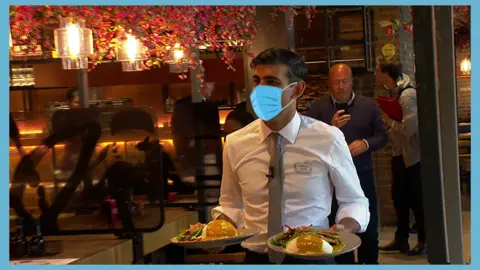 BBC
BBCWhen Chancellor Rishi Sunak served up katsu curries to customers in Wagamama this week, he had his customer service skills down to a tee - the smile, the small talk and even the diplomatic prowess to settle confusion over an order.
But one thing was missing - there wasn't a mask in sight. Of course it's not unusual for a British politician to be seen without a mask. Cabinet ministers are rarely spotted with covered faces.
By comparison their counterparts around the world - from Angela Merkel in Germany, to Shinzo Abe in Japan - have been pictured donning facial coverings in public.
Then on Friday, Prime Minister Boris Johnson was photographed wearing one in a shop, in his constituency of Uxbridge. It came on the day he said all shoppers in England may soon have to wear face coverings in shops.
In England, it is currently mandatory to wear face coverings only on public transport and in hospitals, while people are merely advised to wear one in other enclosed public spaces.
So why aren't more of our politicians wearing face coverings? And could we soon see more of them in masks?
Dr Claudia Pagliari, a psychologist at the University of Edinburgh who specialises in global health, says there's no scientific study showing what politicians think. But she says it may have been a deliberate move to avoid masks.
Some politicians may want to give the impression coronavirus "doesn't pose much of a threat". Or in the case of Mr Sunak's restaurant cameo, she says they could be trying to hammer home the message that the country is "open for business".
"Leaders may be trying to say to their domestic audience, and to the rest of the world: 'My country is strong, I am strong'."
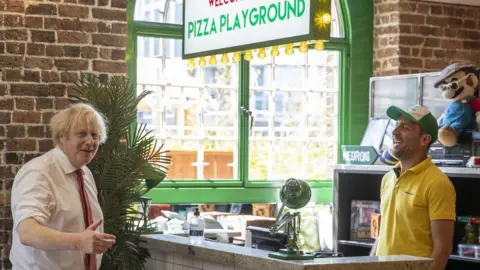 PA Media
PA MediaPoliticians who are relatively new to their posts, like Mr Sunak or Labour leader Sir Keir Starmer, may also want to win over voters with their faces.
They want "to be recognised and also want to be seen as communicating with the public," she says.
Yet other politicians have been out and about wearing masks.
Health Secretary Matt Hancock donned one for a visit to a pharmacy last month. Culture Secretary Oliver Dowden wore one to the Royal Academy this week - although he was following the gallery's rules.
Scotland's First Minister Nicola Sturgeon was pictured in a tartan face covering weeks before they became compulsory in shops there. The rules in Scotland are currently tighter than those in England.
And Dr Pagliari says gestures, such as Ms Sturgeon's, are "a sign that you take this seriously and that you are complying - and that you expect other people to do the same".
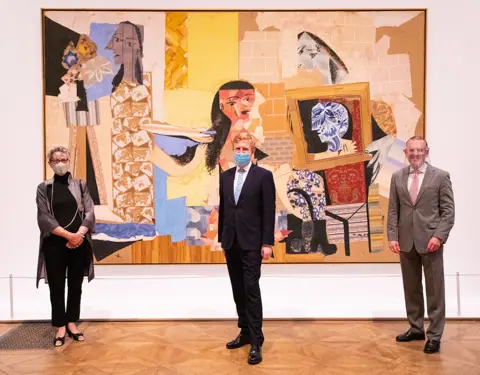 Royal Academy
Royal AcademyThere are calls for UK authorities to change their policies on face coverings.
The British Medical Association has called for them to be worn "as a matter of course" and the Royal Society - the UK's national academy of science - has said people should carry one whenever they leave home so that they can put them on when they enter a crowded public space.
A Royal Society report found 71 countries around the world require face coverings in all public places, and a further 15 in all indoor public places. The UK is not one of them.
Its author Professor Melinda Mills, from the University of Oxford, says her international colleagues find it "strange" that the face coverings are a subject of debate in the UK.
She says Asian countries affected by the Severe Acute Respiratory Syndrome (Sars) outbreak in 2003 have near-universal mask take-up. "It's not even a discussion," she adds.
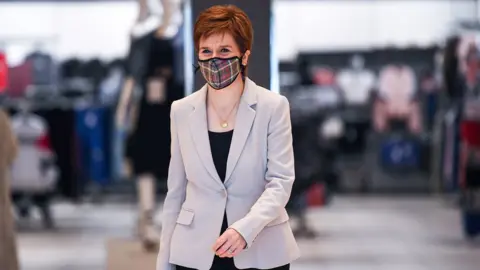 PA Media
PA MediaShe thinks there is more resistance to wearing masks, compared to the guidance around hand-washing or social distancing, "because it's so visual".
But confused messaging has also played a part. In April, the World Health Organization said there was not enough evidence to say healthy people should wear masks. Last month, it changed its advice.
A mixed message
Prof Mills believes the confusion may, in part, explain why many British politicians aren't routinely seen in them. That in turn leaves the public "confused" and disengaged.
"It gives out a mixed message. You see one politician in Scotland wearing a mask and then the leader in England not wearing a mask so it immediately seeds doubt," she says.
"Whereas if you wear a mask, like politicians in virtually all countries across the world are doing, then you give a clear message and you set an example to the public that this is necessary - this is protecting me, but further more, and more importantly, it protects others."
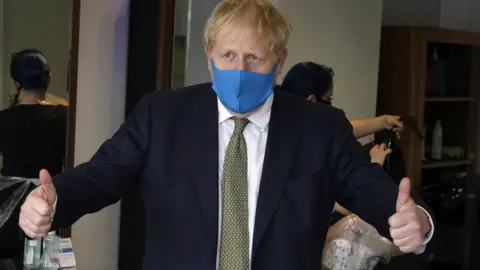 Andrew Parsons Media
Andrew Parsons MediaOn Friday, Boris Johnson seemed to suggest a change to policy in the UK was imminent. He said "the balance of scientific opinion seems to have shifted more in favour" of face masks.
"I don't think we are going to get to a world where we say everyone has to wear face coverings the whole time everywhere," he said, before adding: "We need to be stricter in insisting that people wear face coverings in confined spaces where they are meeting people they don't usually meet."
Later, he was photographed wearing a face mask in a shop in Uxbridge.
Time will tell whether we see more politicians wearing face coverings in public places.

- SOCIAL DISTANCING: What are the rules?
- PUBS: How are they keeping people safe?
- SYMPTOMS: What are they and how to guard against them?
- FACE MASKS: When should you wear one?
- TESTING: Am I eligible for a test?

